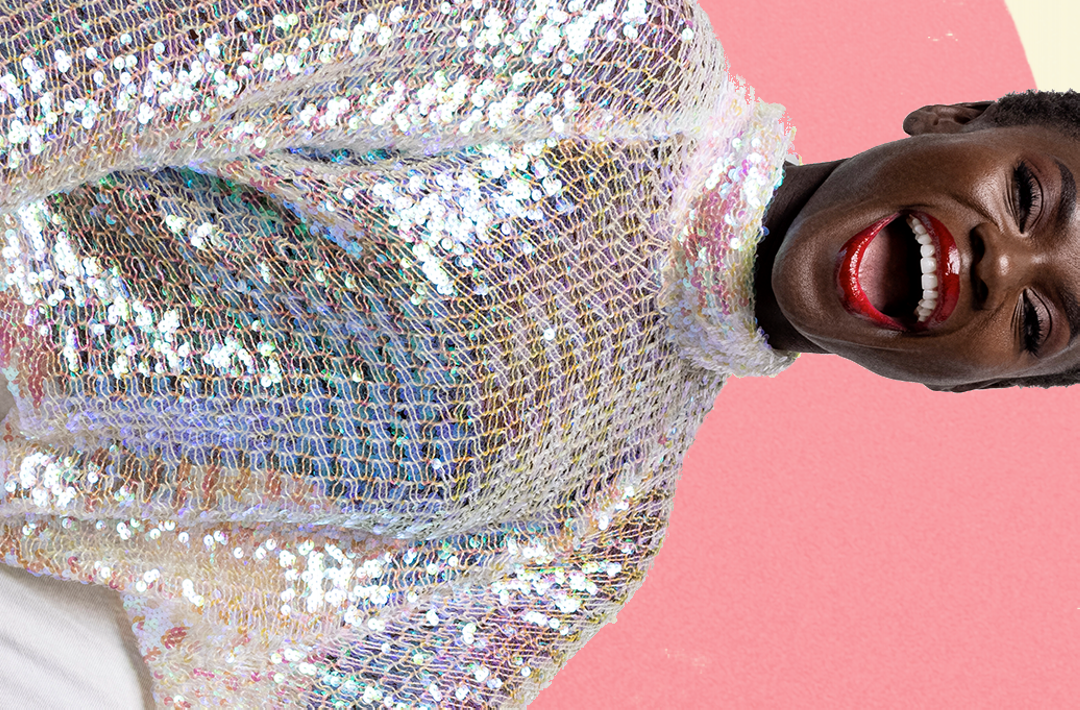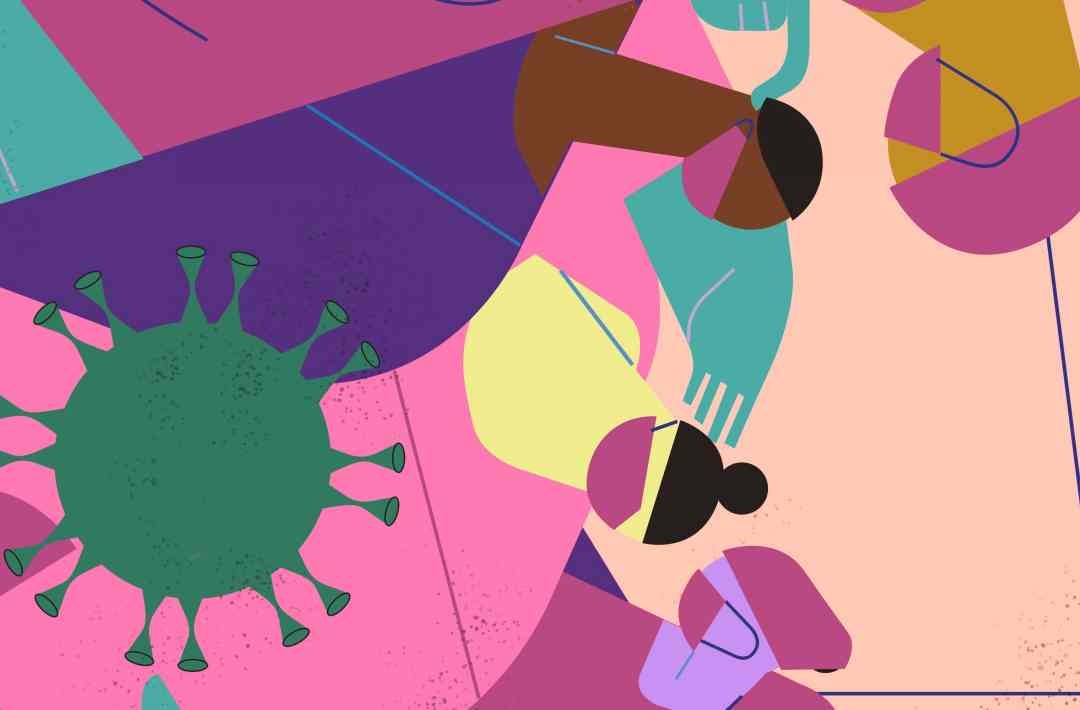

After being in COVID-19 isolation in my Brooklyn apartment for about three weeks this past March, I felt like I had no safe escape. At the time, there were very few coronavirus tests available, but I was displaying symptoms, and they weren’t going away. So I opened my laptop and typed the following questions on the Body Politic COVID-19 Support Group, an online gathering place for people with COVID-19: “Has anyone had pink eye? Random body twitches? Brain fog? How do I know if I have pneumonia?” When there was very little information about the coronavirus, the group gave me hope that I wasn’t imagining things.
Fiona Lowenstein and Sabrina Bleich started the Body Politic COVID-19 Support Group to help people with presumed and diagnosed COVID-19 discuss symptoms, compare the medical care they were receiving, and devise patient advocacy programs.
When Lowenstein had COVID-19 in March, she didn’t know anyone else, besides her partner, who was also sick with it. At the time, news outlets weren’t doing as much reporting on how the virus was impacting younger people, so she wrote an op-ed in the New York Times. “I’m 26. I don’t have any prior autoimmune or respiratory conditions. I work out six times a week and abstain from cigarettes,” she wrote. “I thought my role in the current health crisis would be as an ally to the elderly and compromised. Then, I was hospitalized for COVID-19.”
As a clearer picture of COVID-19 emerges, support groups have followed in its wake. COVID-19 is a highly contagious virus and an incredibly isolating one. There’s still so much we don’t know about it, particularly how it impacts the body long term. With this in mind, many COVID-19 patients and survivors see COVID-19 support groups as a necessary part of navigating the illness’s ups and downs, particularly its long-term impacts. The Body Politic has tried to respond to the overall needs of those who are newly diagnosed or recovering, but also “long haulers”—those COVID-19 survivors with unusual and debilitating symptoms that last months after the initial infection. The website offers a massive list of resources, including webinars, guides, and links on respiratory recovery, as well as pain and fatigue management.
Since March, the Body Politic group has grown rapidly, starting on Whatsapp and moving over to Slack. There are several different discussion channels (for example, resources and tips, recovery, victories, and random humor and positivity). As of October 2020, there were 8,000 international members and 20 volunteer moderators. Many other similar groups are Europe-based and exist on Facebook, including a group called LongCovidSOS, which describes itself as “the voice of the thousands of Long Covid sufferers in the U.K.”
“It continues to become clear that a lot of the issues COVID-19 patients are dealing with are issues that chronically ill people with disabilities have been fighting for, talking about, [and] dealing with for decades,” Lowenstein tells SELF. And COVID-19 support groups, like the Body Politic, can occupy a unique space for those who are dealing with chronic symptoms.
Most Popular
- 5 Less Obvious Signs of Seasonal Depression You Should Definitely Pay Attention To
By Maggie O’Neill
- How Gross Is It to Wear New Clothes Without Washing Them First?
By Julia Ries
- Paxlovid Is Super Promising. Why Aren’t More People Getting It?
By Maggie O’Neill
When Lauren N., 32, discovered the Body Politic, she’d already spent five weeks isolating in her Boston bedroom, and she was navigating both COVID-19 symptoms and its psychological impacts. She’s been symptomatic for nine months now, publicly sharing her experience with issues like shortness of breath and nausea. “Prior to the group, I definitely thought I was alone. I thought I was crazy. I thought I was losing my mind, that I was a hypochondriac,” Lauren, who has since become a moderator and patient advocate in the group, tells SELF. Body Politic moderators and patient advocates onboard new members, monitor discussion channels using conflict de-escalation strategies, and are involved in various committees including an advocacy group that works directly with public health organizations and policy makers.
Though Lauren received a positive COVID-19 test, she says that medical professionals and loved ones made her feel like she was making things up, or just an emotional woman—a drama queen. “Finding a support group with thousands of people from around the world all saying they were having identical symptoms gave me an instant feeling of belonging,” she explains. “I could speak comfortably about my reality [and] my symptoms. I didn’t have to hold back.”
COVID-19 is a relatively new condition, but chronic-illness support groups have been around for quite a while and can be beneficial for several reasons, Julie C.Hill, Ph.D., assistant professor and clinical coordinator in the department of special education, rehabilitation, and counseling at Auburn University, tells SELF. The primary benefit is “knowing there’s someone else that understands what you’re going through, especially if you happen to be somebody that was formerly healthy,” Hill explains, adding that, as you’re trying to adjust, other people in your life may not be able to understand.
“Online support groups connect people to new or developing information, medical resources, and even scientists who are doing research,” Jennifer Diamond, M.A., LMFT, a psychotherapist based in the Bay Area, who supports individuals with chronic illness and has worked with the Body Politic group, tells SELF. “Especially for those who feel extremely alone right now, the groups also create a sense of being seen, heard, and understood.” She believes this kind of ongoing support can mean the difference between merely surviving an illness, like COVID-19, and finding resilience and hope.
“I think every person that’s diagnosed with a chronic illness, whether it’s due to COVID or not related, has to go through a process of grieving,” Hill says. This includes grieving the life they were expecting to have, and accepting that certain things may not be possible anymore, Hill explains. “They may need to adjust expectations around work or going to school or taking care of their families, but… there’s still a new normal that’s possible. They just have to figure out what that looks like.” Grief, something that’s often hidden from public view, is an experience people might feel safe sharing about in a support group.
Most Popular
- 5 Less Obvious Signs of Seasonal Depression You Should Definitely Pay Attention To
By Maggie O’Neill
- How Gross Is It to Wear New Clothes Without Washing Them First?
By Julia Ries
- Paxlovid Is Super Promising. Why Aren’t More People Getting It?
By Maggie O’Neill
Additionally, chronic illness support groups help share resources, including vocational rehabilitation or career counseling services. By talking with others, people might become more aware of their rights under laws like the Americans with Disabilities Act. “A lot of people don’t know what their rights are and don’t know that accommodations are legally entitled to them if they have a disability or a chronic illness,” Diamond explains. Knowing what your new normal may look like and how to get proper support and care is immeasurable.
In my personal experience, the Body Politic group has become one part of my larger support system, giving me a feeling of assurance my therapist and friends might not be able to provide. For individuals who cannot access mental health care due to affordability and other barriers, the support group may provide a sense of belonging and potentially connects people to information they can use to feel better physically or mentally.
Support groups also come with some limitations that it’s important to keep in mind. While support groups can be beneficial, in an ideal world they should not take the place of medical advice, nor should they replace group or individual therapy with a licensed mental health professional. “Information and connection is helpful, but if you’re experiencing overwhelming panic and despair, it’s a good idea to reach out to a therapist who can give you their complete attention and care,” Diamond explains.
This is especially important for those moderating these types of groups. The demand of advocating for scores of people bears a lot of weight, from combing through discussion channels to planning new campaigns and speaking with the press. “Support group administrators, who are mostly COVID-19 survivor volunteers, may be simultaneously pushing through their own fatigue, pain, and brain fog,” Diamond says. “These are some of the most fierce patient advocates I’ve witnessed, and yet, we must make sure they don’t sacrifice their own health while supporting others.”
Lauren, who has experienced increased stress and panic attacks while coping with COVID-19 and being a patient advocate, puts it this way: “A lot of us [moderators] are still dealing with symptoms. We’re dealing with going to doctors, figuring out our own medical needs while also trying to advocate [and maintain] a full-time job.” But, she says, advocates in groups like the Body Politic are committed to shining a light on coronavirus survivors’ experiences because “we are the precedent,” Lauren says. No one else can put the reality of being a coronavirus survivor into words the way those who have lived through it—or are living through it—can.
As with any community, boundaries are necessary. Support group members, moderators or not, need to try to stay mindful about how they engage with others seeking connection, even though that can be difficult and a moving target. “Just like we need to limit our news intake, it’s important to find that sweet spot when consuming new information,” Diamond says. When feeling lost, it’s easy to turn to those who understand what we’re going through, but it’s essential to make sure that’s contributing to our self-care, not sapping it. “If you join an online support group, keep checking in with yourself: Does this feel helpful? How does my body feel afterward? Do I feel more grounded and hopeful? Do I feel more fatigued and overwhelmed?” Diamond says. “Your answers will give you important information about what your body needs and how you want to participate. There is no wrong way to need support.”
















